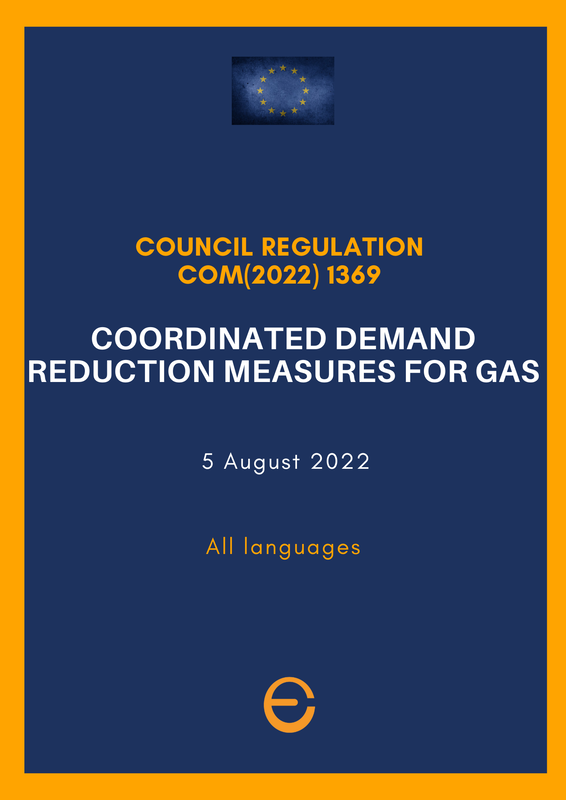EU Special Measures on Gas
Brussels, 31 August 2022
On 9 September 2022, new meeting of the EU Council Ministers for Energy. On the table the crisis of energy market and how to counter the gas price rise and the reduction quantity from Russia. In the meantime, the 27 Member States adopted a Regulation to reduce by 15% the gas consumption, giving exceptional powers to the Commission in the event of a major energy crisis in Europe. Measures to help member states that no longer receive gas, with special financial aid. Some Member States were skeptical, because the measure could provide cover for a tug-of-war between the Eastern EU countries and Russia, putting the whole of Europe in difficulty.
|
Last July, the EU Council adopted a Commission proposal to reduce gas consumption by 15% between 1 August 2022 and 31 March 2023. And to give the Commission the possibility to declare, after consulting the Member States, a "Union alert" on security of supply, imposing a mandatory reduction of gas demand on all Member States. The Union alarm should be triggered when there is a substantial risk of a severe gas shortage or exceptionally high demand for gas. Member States should update their national contingency plans by the end of September to show how they intend to achieve the reduction target and should report to the Commission on the progress every two months. Member States requesting solidarity gas supplies will have to demonstrate the measures they have taken to reduce demand at national level. What the EU has adopted 27
Voluntary demand reduction On voluntary basis, Member States shall use their best efforts to reduce their gas consumption in the period from 1 August 2022 to 31 March 2023 at least by 15 % compared to their average gas consumption in the period from 1 August to 31 March during the five consecutive years preceding the date of entry into force of this Regulation (‘voluntary demand reduction’). Articles 6, 7 and 8 of the Regulation shall apply to those voluntary demand-reduction measures. |
Mandatory to reduce gas consumption
If the Commission issues an alert, the Council, by means of an implementing decision, can declare a Union alert and the reduction of gas consumption becomes mandatory. The Commission issues the alert if five or more national energy authorities declare a crisis in their country.
In order to secure the mandatory reduction of gas consumption, the Council can modify the Commission proposal only by a qualified majority. The Council Implementing Decision for the mandatory reduction of gas consumption lapses with a new Implementing Decision to end the reduction on a proposal from the Commission.
However, as the largest EU countries have opposed the 15% cut in gas consumption (being the largest EU producers), the reduction can go down to 7% in particular conditions.
If the Commission issues an alert, the Council, by means of an implementing decision, can declare a Union alert and the reduction of gas consumption becomes mandatory. The Commission issues the alert if five or more national energy authorities declare a crisis in their country.
In order to secure the mandatory reduction of gas consumption, the Council can modify the Commission proposal only by a qualified majority. The Council Implementing Decision for the mandatory reduction of gas consumption lapses with a new Implementing Decision to end the reduction on a proposal from the Commission.
However, as the largest EU countries have opposed the 15% cut in gas consumption (being the largest EU producers), the reduction can go down to 7% in particular conditions.
Other measures on gas and energy
To help Member States deliver the necessary demand reductions, the Commission has also adopted a European Gas Demand Reduction Plan which sets out measures, principles and criteria for coordinated demand reduction. The Plan focuses on substitution of gas with other fuels, and overall energy savings in all sectors. It aims to safeguard supply to households and essential users like hospitals, but also industries that are decisive for the provision of essential products and services to the economy, and for EU supply chains and competitiveness. The Plan provides guidelines for Member States to take into account when planning curtailment.
Another important pillar of energy saving is the reduction of heating and cooling. The Commission urges all Member States to launch public awareness campaigns to promote the reduction of heating and cooling on a broad scale, and to implement the EU ‘Save Energy Communication', containing numerous options for short-term savings. To set an example, Member States could mandate a targeted lowering of heating and cooling in buildings operated by public authorities.
The Demand Reduction Plan will also help Member States identify and prioritise, within their “non-protected” consumer groups, the most critical customers or installations based on overall economic considerations and the following criteria:
© Copyright eEuropa Belgium 2020-2022
To help Member States deliver the necessary demand reductions, the Commission has also adopted a European Gas Demand Reduction Plan which sets out measures, principles and criteria for coordinated demand reduction. The Plan focuses on substitution of gas with other fuels, and overall energy savings in all sectors. It aims to safeguard supply to households and essential users like hospitals, but also industries that are decisive for the provision of essential products and services to the economy, and for EU supply chains and competitiveness. The Plan provides guidelines for Member States to take into account when planning curtailment.
Another important pillar of energy saving is the reduction of heating and cooling. The Commission urges all Member States to launch public awareness campaigns to promote the reduction of heating and cooling on a broad scale, and to implement the EU ‘Save Energy Communication', containing numerous options for short-term savings. To set an example, Member States could mandate a targeted lowering of heating and cooling in buildings operated by public authorities.
The Demand Reduction Plan will also help Member States identify and prioritise, within their “non-protected” consumer groups, the most critical customers or installations based on overall economic considerations and the following criteria:
- Societal criticality – sectors including health, food, safety, security, refineries and defence, as well as the provision of environmental services;
- Cross-border supply chains – sectors or industries providing goods and services critical to the smooth functioning of EU supply chains;
- Damage to installations – to avoid that they could not resume production without significant delays, repairs, regulatory approval and costs;
- ...
© Copyright eEuropa Belgium 2020-2022



